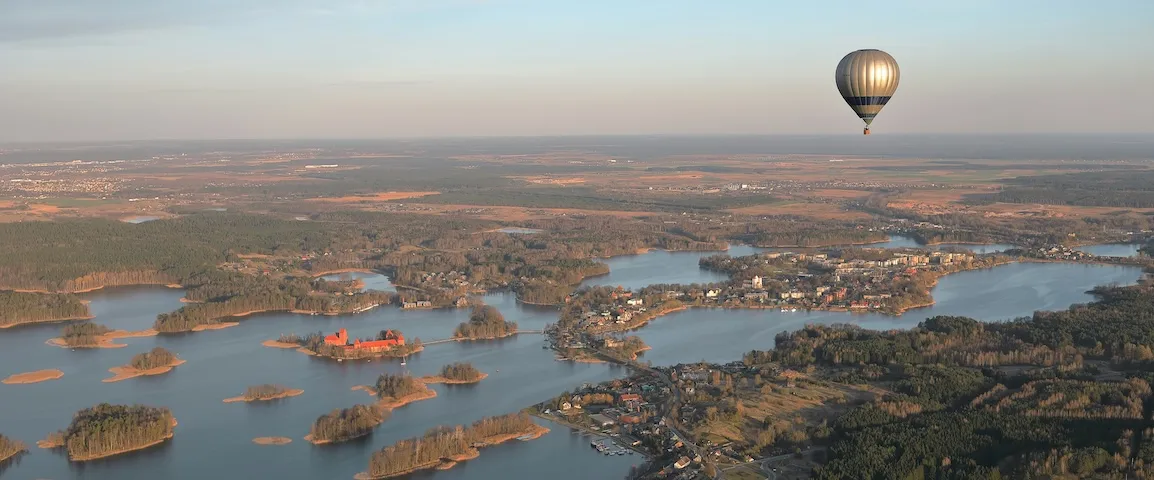Home > Your Guide to Lithuania Visas: Everything You Need to Know

Your Guide to Lithuania Visas: Everything You Need to Know
Traveling to Lithuania is an exciting adventure, filled with stunning landscapes, rich history, and vibrant culture. From its capital city of Vilnius to its treasured landmarks like the Hill of Crosses and Curonian Spit, Lithuania is a top destination for many travelers.
However, before you pack your bags, it’s essential to understand the visa requirements and application process for Lithuania. In this article, we’ll explore everything you need to know about applying for a Lithuania visa, including details for US citizens and digital nomads!
Do I need a visa to go to Lithuania?
It depends. Whether or not you need a visa to enter Lithuania largely depends on your nationality and the purpose of your visit.
If you’re from a visa-exempt country, such as the US, UK, or Canada, you will not need a visa for short stays of up to 90 days. You'll need to obtain a visa for longer stays (more than 90 days).
If you’re not from a visa-exempt country, like China, Russia, or India for example, you need to apply for a visa to travel to Lithuania, regardless of the length of your stay.
Do US citizens need a visa for Lithuania?
In short, no. US citizens planning to visit Lithuania for tourism or business for up to 90 days within a 180-day period do not need a visa. This is great news for those looking to explore this beautiful country without the hassle of a visa application.
If your trip is going to exceed 90 days, or if you’re going to Lithuania to work or study, you will need to apply for the appropriate visa.
How long can you stay in Lithuania without a visa?
Visa-exempt travelers can stay in Lithuania for up to 90 days without applying for a visa. This is within any given 180-day period. If you'd like to stay in Lithuania for more than 90 days, you will need to apply for a visa.
How do I apply for a Lithuanian visa?
If you need a visa to travel to Lithuania, the application process is fairly straightforward.
You’ll need to:
- Determine which type of visa you need.
- Prepare the required documents.
- Book an appointment at a visa center or consulate in your country of residence.
- Pay your application fees.
- Attend your appointment and submit your biometrics on-site.
- Receive a decision.
In the coming years, this process will change with the introduction of EU VAP, an online platform for Schengen visa applicants, but for now, the process remains the same.
Can I apply for a Lithuania visa online?
Currently, you cannot complete the Lithuania visa application process online; however, you can fill out the application form and gather your documents in advance. You’ll also book your visa appointment online.
A crucial part of the application process involves attending a Lithuania visa appointment at the nearest visa center or consulate in your country of residence.
In the coming years, you will be able to apply for Lithuania visas online through EU VAP, but this platform hasn’t been launched yet.
Is a Lithuania visa difficult to get?
When it comes to the process itself, the Lithuania visa application is fairly straightforward.
As for obtaining a visa, the embassy has the final say and it’s never guaranteed.
What is the rejection rate for Lithuania visas?
In 2023, the Lithuania visa rejection rate was 12.75%, globally. Common reasons for visa rejection include incomplete applications, or inability to prove sufficient financial means.
Keep in mind that 12.75% is a global number. Visa rejection rates vary based on a variety of factors including nationality, visa type, and more.
What Is the processing time for a Lithuania visa?
Processing times can vary, but it typically takes about 15 calendar days for Schengen visas. During peak seasons, it may take longer. In addition to that, visa appointments are sometimes booked out weeks, if not months in advance, so plan accordingly.
Lithuania visa application requirements
Now, let’s dive into what you’ll need when applying for a Lithuania visa. There are a few essential documents that will be needed regardless of the type of visa you’re applying for. If you’re applying for a long-stay visa, especially to work or to study, there will be documents required in addition to these standard essential ones.
Which documents are required when applying for a Lithuania visa?
- A completed visa application form
- A valid passport (valid for at least three months beyond your planned departure)
- Photos that meet Schengen requirements (passport-sized)
- Schengen travel insurance (that is compliant)
- Proof of accommodation (such as hotel bookings)
- Flight itinerary (with a return flight or a reservation for one)
- Proof of funds (to show that you can sustain yourself while abroad)
What are the Lithuania visa requirements for specific types of visas?
The requirements vary based on the type of visa you are applying for. If you’re applying to work in Lithuania, you will likely need to present documentation proving your need to work (such as a contract). If you’re traveling to Lithuania to study abroad, you’ll likely be required to show proof of enrollment/acceptance into a Lithuanian educational institution.
When you are ready to apply, the visa center or consulate will provide you with a list of all of the necessary documentation you’ll need to provide.
Is there an interview when applying for a Lithuanian visa?
Sort of – you must apply for your Lithuania visa in person at a pre-scheduled appointment. This appointment is your “interview”.
At your appointment, an attendant will look through your documents to ensure your application is complete. They may ask you a few questions about the documentation you’ve provided and your upcoming trip.
In addition to that, your biometrics will be taken at this appointment and submitted along with your application. While it can sound intimidating, the appointment is to ensure your application is complete and sent to the embassy for a decision to be made.
How much does a Lithuania visa cost?
Visa fees can vary depending on the type of visa. A Schengen visa costs 90 euros for adults, 45 for children ages 6-12, and is waived for children under the age of 6. Keep in mind that fees may vary for long-stay visas or specific types of visas. Also, when applying through a visa processor, there will likely be associated service fees in addition to the standard fees.
Keep in mind that applying through a trusted visa processor may be mandatory.

Do I need to apply for ETIAS If I have a Lithuania visa?
No, if you have a Lithuania/Schengen visa, you do not need to apply for ETIAS (European Travel Information and Authorization System) for entry. Additionally, if you are a citizen of a Schengen member country, you do not need ETIAS to travel to Lithuania.
Who needs ETIAS to visit Lithuania?
Citizens from visa-exempt countries, including the US, will need to apply for ETIAS starting in 2026 for short stays (up to 90 days). If you plan to stay longer than 90 days in Lithuania, or the Schengen area in general, you will need to apply for a visa, not ETIAS.
Read more in our Lithuania ETIAS Guide.
Is Lithuania part of the Schengen zone?
Yes. Lithuania is a member of the Schengen zone, which allows for free travel between member states.
Does my Lithuanian visa allow me to travel through the Schengen zone?
Yes! A valid Lithuania visa generally allows you to travel freely within the Schengen area during your visa’s validity. You can enjoy traveling from Lithuania to Estonia, Latvia, Poland, or anywhere else in the Schengen area.
In some cases, authorization can vary. Always check the details of your visa before making travel plans.
Can I go anywhere in Europe with a Lithuanian visa?
A Lithuanian Schengen visa doesn’t give you clearance to enter any country in Europe. However, you can typically travel to any Schengen area country, which comprises 29 countries, giving you many destinations to choose from.
Similar guides
Heading to France? Getting a visa for France
Planning a trip to Italy? Learn about Italian visas
Germany on the horizon? You may need a German visa
Off to the Netherlands? Learn about Dutch visas
Are you going to Greece? Check if you need a Greek visa
Planning a trip to Malta? Getting a visa for Malta
Going to Spain? Do I need a visa to go to Spain
Off to Iceland? Check out the Iceland visa guide
Going to Hungary? Read about Hungarian visas
Trip to Austria coming up? Read our Austria visa guide
Planning to go to Switzerland? Read about Swiss visas
Trip to Luxembourg coming up? Read about Luxembourg visas
Are you going to Norway? Read the Norway visa guide
Trip to Poland? Learn all about Polish visas
Planning a trip to Croatia? Learn about Croatia visa requirements
Are you going to the Czech Republic? Read about Czech visas here
Going to Denmark? Read our Denmark visa guide
Going to Bulgaria? You might need a Bulgarian visa
Traveling to Liechtenstein? See Liechtenstein visa information
Are you traveling to Sweden? Learn about Swedish visas
Heading to Estonia? Learn about Estonian visas
Heading to Romania? Getting a visa for Romania
Trip to Finland on the horizon? You may need a Finnish visa
Planning a trip to Slovakia? You may need a Slovakian visa
Trip to Latvia? You may need a Latvian visa
Going to Portugal? Read our Portugal visa guide
Planning a trip to Belgium? Read the Belgium visa guide
